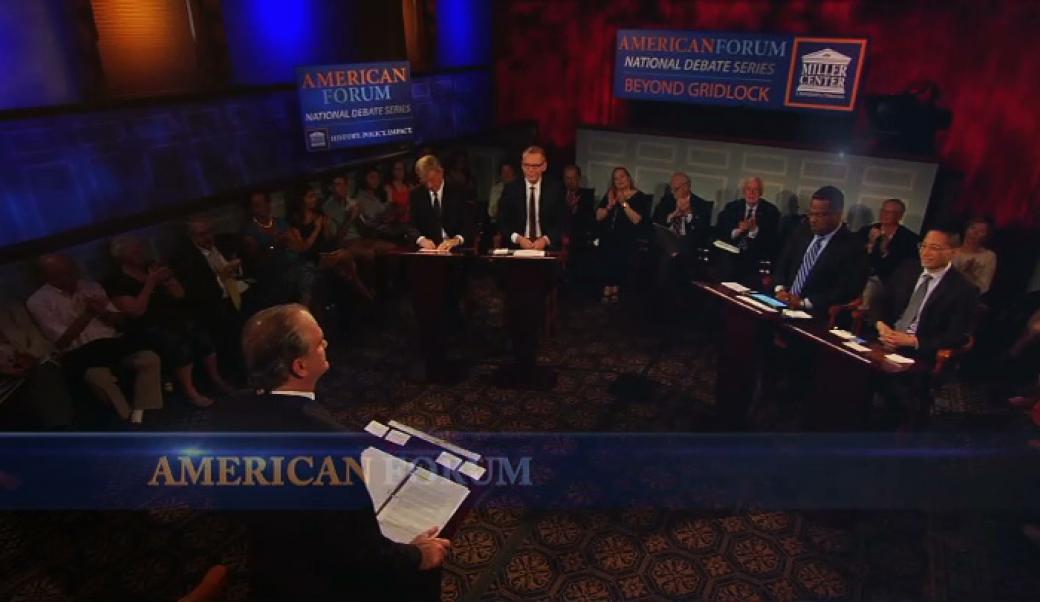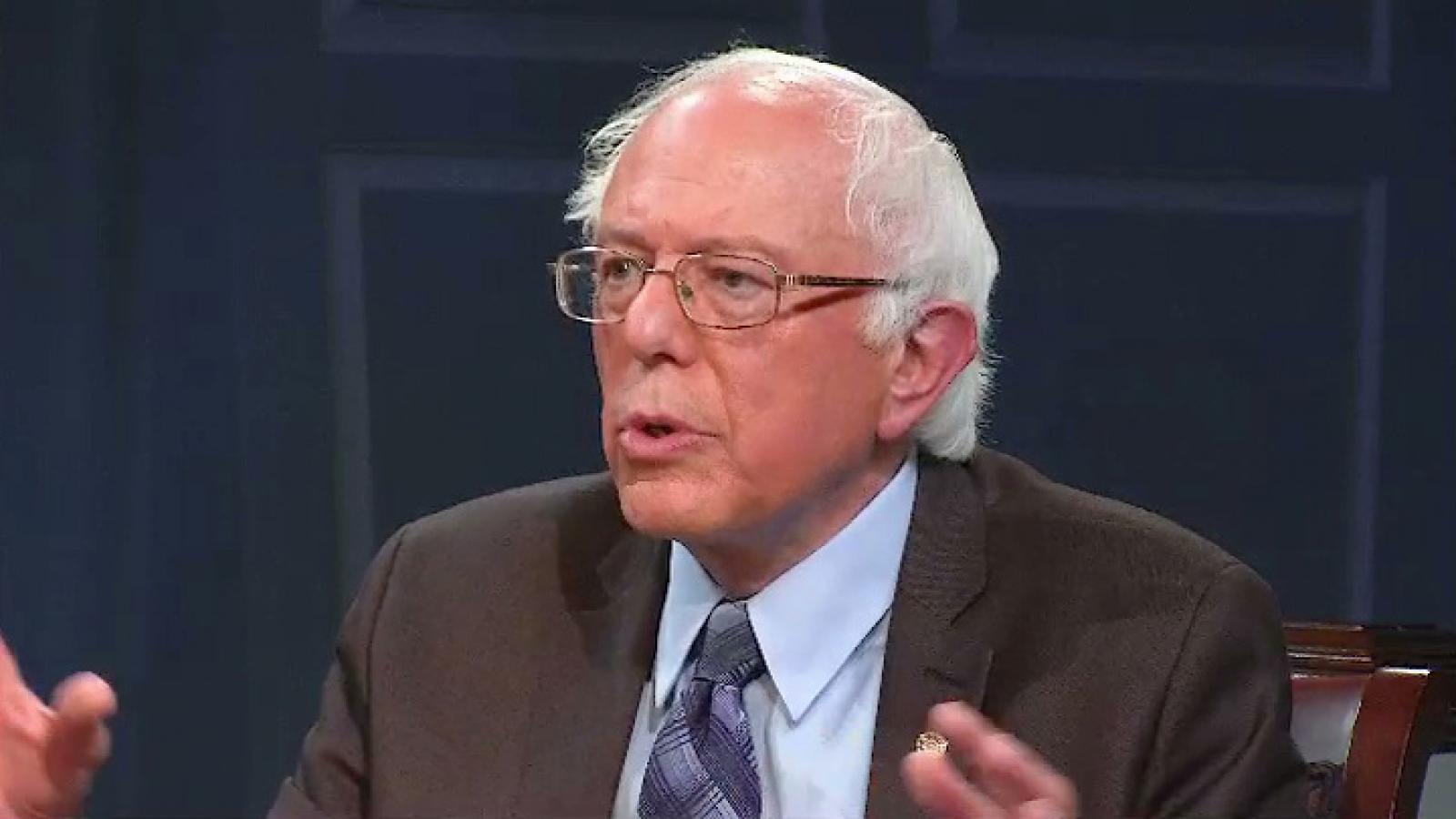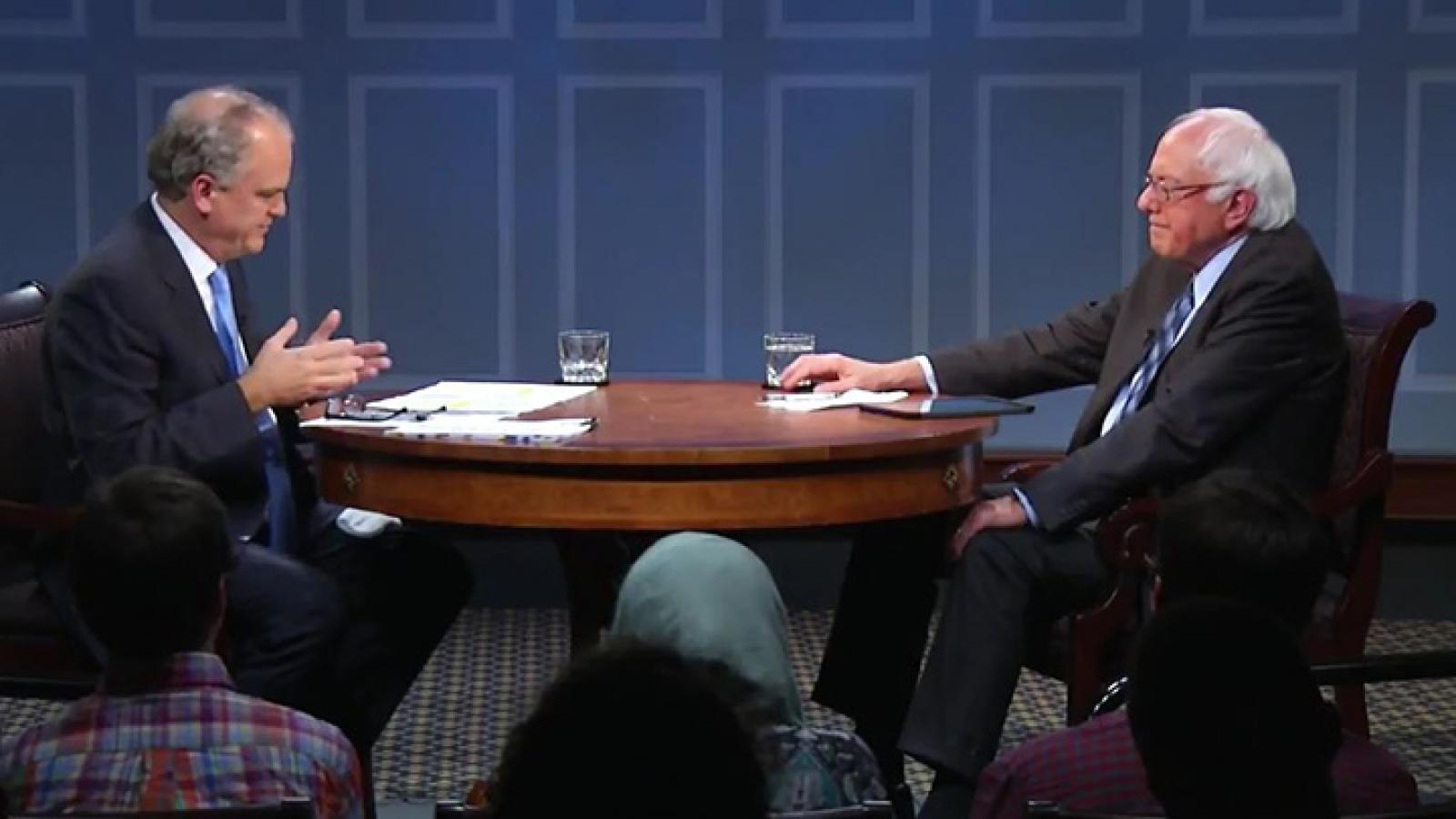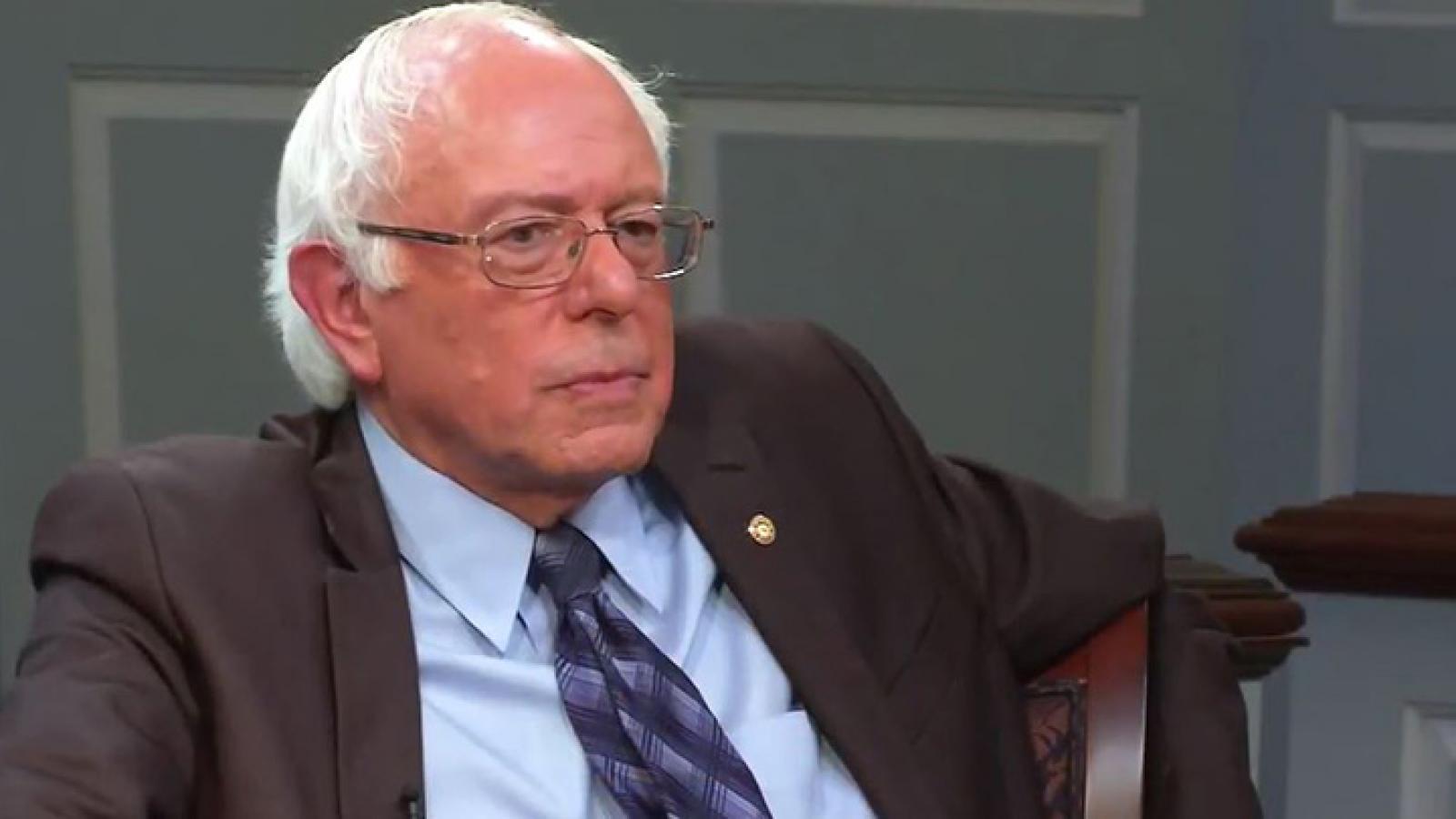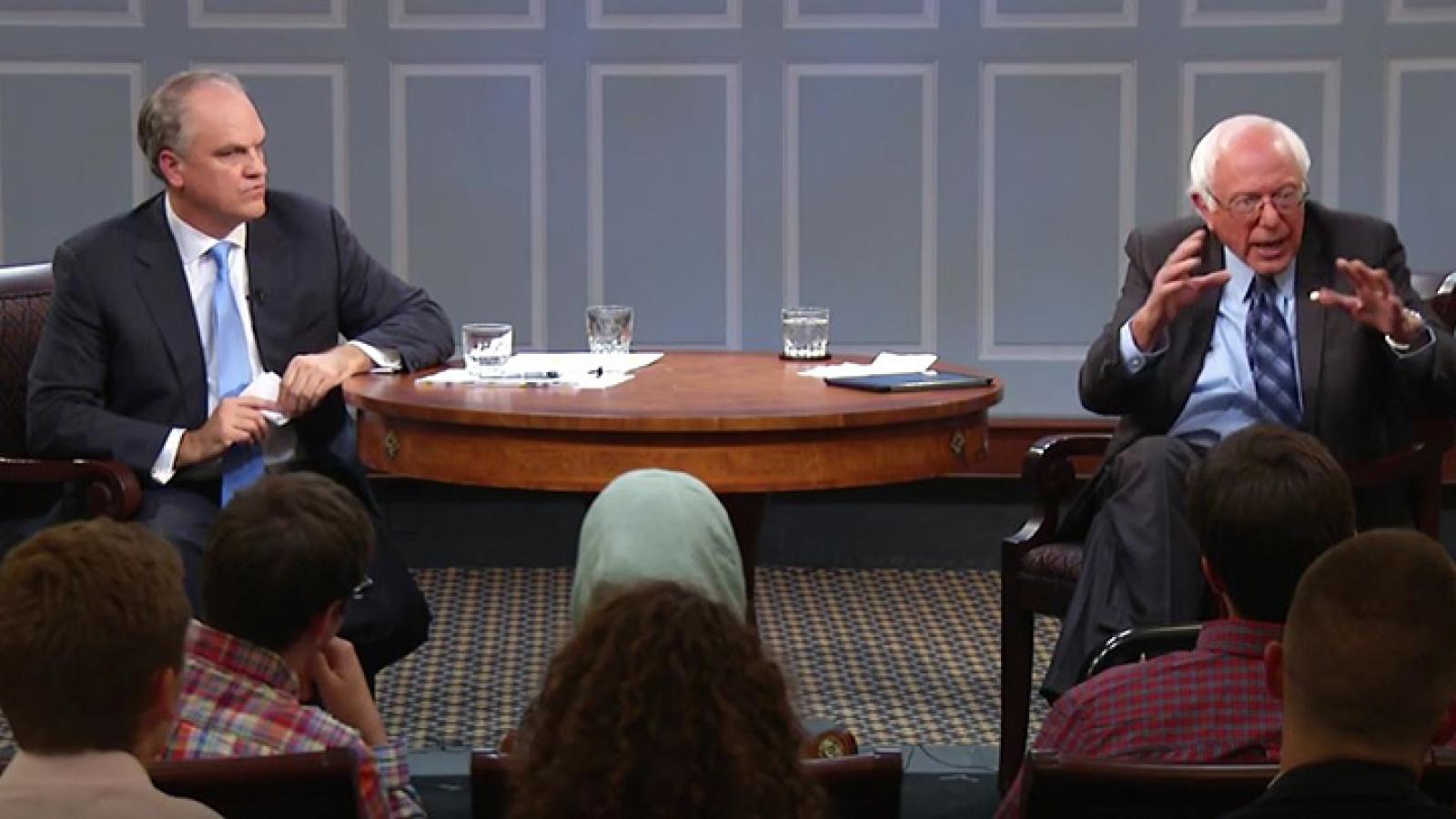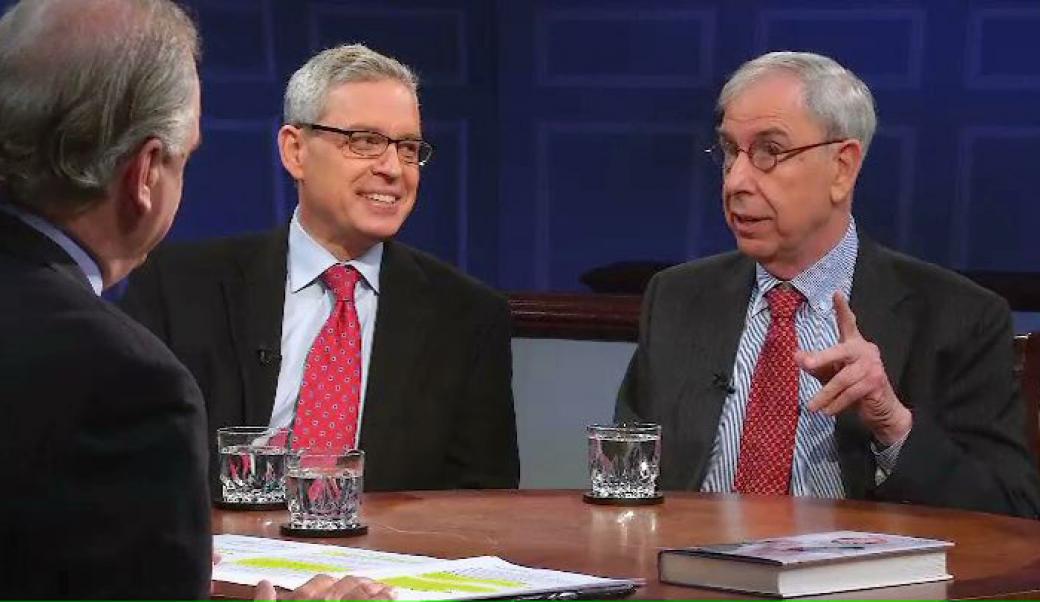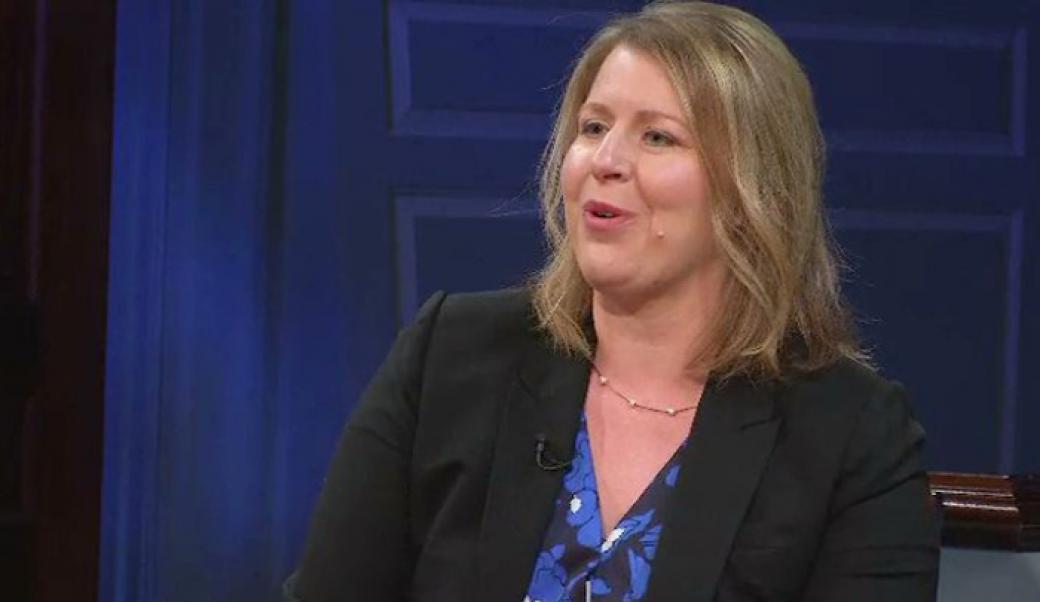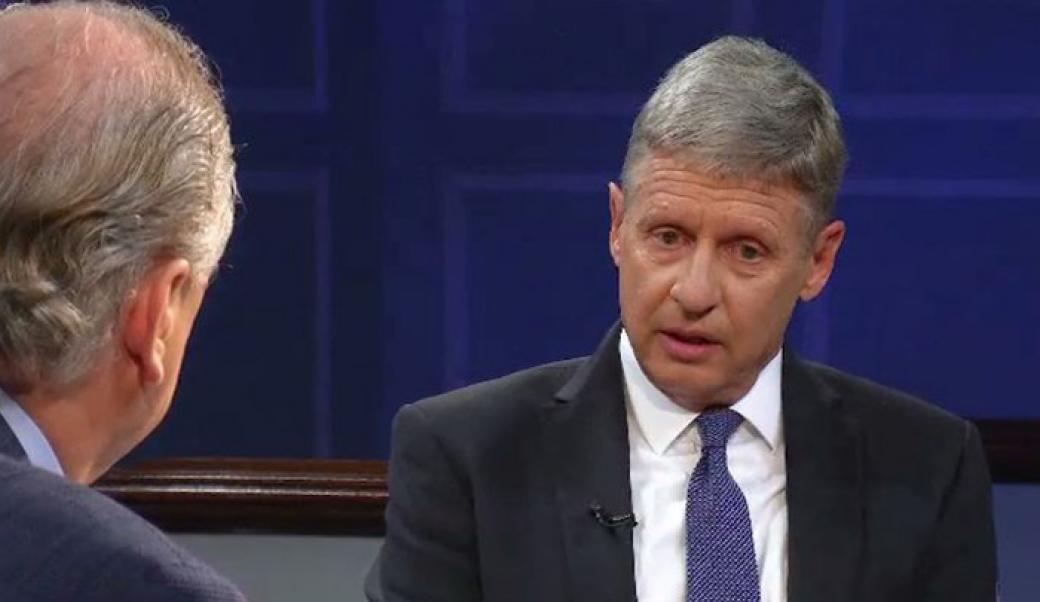About this episode
February 01, 2016
Bernie Sanders
Senator Bernie Sanders discusses his run for the 2016 Democratic presidential nomination and political trends in America.
Political Parties and Movements
A conversation with Bernie Sanders
Transcript
16:12:50;15 Douglas Blackmon: Welcome back, I’m Doug Blackmon. Our guest in this episode of American Forum is Bernie Sanders, United States Senator from Vermont, a former U.S. Congressman, former city mayor, self-proclaimed “Democratic-Socialist,” and since April 2015, a candidate for the Democratic presidential nomination. Thank you for being here.
16:13:11;10 Bernie Sanders: My pleasure.
16:13:12;15 Blackmon: I should warn you, Senator Sanders, that a couple days ago I tweeted out a request for suggestions of what I should ask you in the course of this interview. And in the past two days that ended up being a conversation with about 200 thousand people as of this morning.
16:13:31;26 Sanders: It’s going to be a very long interview I would say.
16:13:34;05 Blackmon: That’s why this stack is so big. That’s the stack here and this is only the good ones. I’m glad you agreed to be here for many hours. But through these suggestions that came in, it’s very obvious that you’ve captured the enthusiasm and imagination of a very substantial group of people who are very concerned about the issues that you talk about and are concerned about. But there is a good deal of confusion I think still about who you are and what you stand for and really in particular in terms of what you would do if you became president of the United States. And also what it means that you call yourself a socialist, a Democratic-Socialist. But so what really is the difference between a very liberal Democrat and a Democratic Socialist?
16:14:55;10 Sanders: I think as a nation it’s important for us to understand that there are countries around the world that are doing some really interesting things and have done them historically. For example I think many Americans don’t know that we’re the only major country on earth, Doug, that doesn’t guarantee health care for all people. So there’s a great debate over the Affordable Care Act for all people. I supported it. We still have 35 million Americans with no health insurance. We pay the highest prices in the world for prescription drugs. I live 100 miles away from Canada. Health care is a right for all people it’s not controversial. UK, France, Germany, Scandinavia. I believe that government has got to represent all the people. And not as increasingly the case in the United States, the billionaire class in corporate America. I think that health care, for example, is a right of all people. Another example. If you go to Germany today, you will find that college in Germany universities are all free. And Germany, in fact the American students are going to Germany and getting a free education. True in Scandinavia. True in other countries around the world.
16:19:06;22 Blackmon: What’s the likelihood that the agenda that you’re talking about now that you could push forward?
16:19:50;22 Sanders: That’s a great question. In many ways that is a question that I have been talking about from day one of this campaign. This is what I say. What I say is that no president of the United States, not Bernie Sanders, not anybody else, not the best president you can think of can, in fact, address the enormous problems facing this country. That is the collapse of the American middle class, income and wealth inequality, the fact that we are behind many of the other countries in terms of health care and education. No president can address that without a political revolution. Now what you say is… well, what you are implying this is the reality we face. We have got to change that reality. Virtually everything that I talk about is supported in very strong numbers by the American people. Why aren’t we implementing that? Why aren’t we listening to the American people? The American people want to raise the minimum wage. The American people want to rebuild the infrastructure and create millions of jobs. The American people want the rich and large corporations to pay more in taxes. That’s not Bernie Sanders. That’s what the American people want. Why doesn’t it happen? Well it happens that when you go on the floor of the United States Senate the Republican agenda is exactly the opposite. They want to give more tax breaks to billionaires. They want to cut Social Security; they want to cut Medicare; they want to cut Medicaid. Exactly the opposite of what the American people want. Why is that? Well that takes us to a campaign finance system which is a total disgrace and which is allowing big money entrust to purchase of the United States government. So when I talk about my agenda I do not say, “Hey vote for me and I’m going to implement all of this on day one.” I never say that. What I say is that we need tens of millions of people to become involved in the political process in a way that has not happened before. That is what this campaign is about. Not just electing Bernie Sanders; it’s creating what’s called a political revolution
Blackmon: The American people often times are very much in concert around things in broad terms like gun control, but then a lot of American people end up unwilling to move forward in certain ways when you get down to the hard facts and specifics. The same applies to things like the minimum wage. When….
16:23:08;20 Sanders: Opp, opp, opp. Let me disagree with you. It’s not the case. The American people want to raise the minimum wage. It’s our Republican colleagues in Congress who refuse to do that an in fact in many instances want to do away with the concept of minimum wage and lower the minimum wage. So I don’t agree with you. I think what we have seen actually in the last few years, it’s interesting that you raised that question. As a result of fast food workers and other low wage workers going out in the streets and I’ve been with them in some of these fights. Going on strike. Rallying the American people we have come an enormous way in raising consciousness in cities like Seattle, Los Angeles, New York State moving forward to raise the minimum wage to fifteen bucks an hour. Which is my view.
16:24:02;00 Blackmon: At the same time there are business owners in not just the Republican Party who say wait a minute, this may cause us some real problems. There are some real concerns about that that are not completely invalid. And, in fact, among those 200 thousand folks who I was in conversation with earlier was my 14-year-old daughter which was my pleasure.
16:24:21;04 Sanders: She runs a business. This is incredible! A very precocious kid.
16:24:26;07 Blackmon: She is very precocious. And so I’m going to exert my host discretion and ask the question that came from her on this very topic. Her name is Collette Blackmon. She asks, she told me to ask you raising the minimum wage to fifteen dollars will help many workers come out of poverty. But what about small business owners who can’t afford to pay their workers this much and the employees are subsequently laid off?
16:24:50;19 Sanders: That’s a good question. The answer is, and why I prefer to do a national minimum wage rather than see states and cities just do it, is that we do it nationally everybody is in the same boat. And I’m not here, I’m not here to tell you that there will not be cases where more businesses may be negatively impacted. But I think the positive greatly outweighs the negative because what we have seen over many, many years is the minimum wage has not kept up with inflation. And it is much lower today than it was 30 or 40 years ago. Second point, I believe that the way we create jobs in this country and stimulate the economy is putting money into the hands of working people because millions of whom have no disposable income whatsoever. So if you raise, if somebody is now making eight or nine bucks an hour and over a period of years, Doug, we’re not talking about doing this overnight. It would be a gradual increase over a period of years. That worker will now have more money. That worker will now be able to go out and buy goods and services. And when he or she does that and spends that money they then create jobs for other people. I think if we are serious about trying to move our economy forward and seek economic growth, one of the import ways is to put money into the hands of people who do not have it. And people who make seven and a quarter or eight bucks an hour do not have it.
16:26:14;22 Blackmon: Again I want to come back to you trying to establish with just a little clarity what the boundaries of your economic perspective are. Because when we use the word Socialist in any kind of way that invokes a lot of things for a lot of people. Some of the more successful Socialist governments in the past and other countries that nationalized institutions like banks. I know you are not espousing that but if we go back to 2008, 2009 the financial crisis would you have reacted in a more interventionist way?
16:27:11;20 Sanders: Well let me tell you what I would have done. I was in the Senate and I will never forget Ben Bernanke and the Secretary of the Treasury walking into the Democratic caucus they went into the Republican caucus as well and basically saying that if you guys do not come up with a huge amount of money, something like seven hundred billion dollars, we think the American financial system will collapse and that may take down the entire world’s economy. Other than that, not a serious problem. Now my response was twofold. First of all, and I would ask your viewers to go to YouTube and check it out. When I was in the House, I was a member of the House, it was then called the House Banking Committee now called Financial Services Committee. Check out the discussion I had with Alan Greenspan about his desire to deregulate Wall Street. To allow investor banks to merge with commercial banks to merge with insurance companies to do away with Glass-Steagall. Here are the questions that I asked him. What I believe at that time if you do that it would have it would be a disaster it turned out to be right. So you’re looking at a guy who did everything that he could to prevent the deregulation of Wall Street because I don’t trust Wall Street. Frankly, don’t tell anybody, but it is my view that the business model of Wall Street is basically fraud. And I think that what we have seen over the years is time after time, with minimum regulations, banks being caught cheating and doing illegal things. So I happen to have fought against the deregulation. Right now in this country, if I am right, I’m not wrong by much if I’m not, is that we have six of the largest financial institutions today of assets of about eleven trillion dollars. That is about 60 percent of the GDP of the United States of America. They issue about two-thirds of the credit cards and about 35 percent of the mortgages. What I would have said then and what I say now is when you have financial institutions that are so large and, by the way, everybody should know this, three out of the four largest institutions in the country today are significantly larger than they were when we bailed them out because they were too big to fail. So what do I think? I think number one, you bring back Glass-Steagall and you start re-regulating them. But more importantly if Teddy Roosevelt were alive today, a good Republican, what he would say is break them up. That’s my view. If a bank is too big to fail it’s too big to exist. That was my position then and that is my position today.
16:30:52;19 Blackmon: I don’t mean to challenge your depiction of Wall Street as a kind of racketeering . . . industry.
16:31:02;23 Sanders: That’s a good definition. That’s not bad.
16:31:05;26 Blackmon: I thought I was summarizing it… But among the many questions that came in this is one version of one that came in from many people someone named Warren Strong, @wgstrong if anybody wants to reach out to him, ask him the if innovations like Twitter would exist in a Socialistic economy when taking risks goes unrewarded?
16:31:43;20 Sanders: First, again, I talk about the Democratic Socialistic society I’m looking about, I’m looking at governments in Europe over the last many, many decades. Some of them had labor governments. Some of them had Social Democratic governments, some Social. Countries like Denmark, Finland, and Norway and other countries who in my view have done pretty good things in terms of childhood poverty rates a fraction of what they are in the United States. Now if you go to a country like Sweden, if you go to a country like Denmark these are very innovative countries. Now they are very small countries. They’re homogenous countries. It’s wrong to economically compare them to a complicated large country like the United States of America. But of course this is what I want to see. I do want to see entrepreneurial activity. I do want to see innovation. I do want to see the creation of wealth. But I do not want to see a situation where the top of one tenth of one percent in our country owns almost as much wealth as the bottom 90 percent. I do not want to see a situation where today 58 percent of all the income is going to the top one percent.
16:36:37;08 Blackmon: I don’t want to spend much of our time asking you about your opponents because we’re really interested in you but there are two things I will ask you that relates to Hillary Clinton. And one is and this is a question that my daughter did not suggest but that I ask on her behalf in some respects after having listened to her and that as interesting as you are to her and the ideas that you are presenting, she and millions of other women, young women and girls have also been inspired by the idea that a woman of such accomplishments as Hillary Clinton is certainly qualified to be president as anyone could possibly be. What a triumph it would be for our society of course for someone like that to be elected President of the United States. So what would you say to my daughter to explain why it is worth it to forego that triumph in her mind and make you President of the United States?
16:37:22;04 Sanders: Well I think your daughter makes a very good point and I understand there are millions of people not just women, men as well who want to see us breakdown the discriminatory barriers that have been placed in front of women for so many years. But think when we look at where we are as a country I think it’s important to take a hard look at what the candidates are talking about and how they will respond to the crises that we face. And I think if you compare Hillary Clinton, and I’ve known Hillary Clinton for 25 years. I consider her a friend, and you’re quite right, she has a remarkable record of public achievement. But I think if you look at Hillary Clinton’s views on the issues which is what this campaign is about, I think the views that I am fighting for, the positions that I’m fighting for will do more to address the very serious crisis facing the middle class and working families. So Hillary Clinton and I have some strong disagreements. I mentioned a moment ago I want to see the minimum wage raised over a period of years to $15 an hour, she’s not been clear on that. I am very concerned and have been for many years about our trade policies which I believe have been a disaster. That’s not NAFTA, CAFTA, permanent normal trade relations with China this TPP which we’re debating right now. I have opposed these agreements because I think they have resulted in the loss of millions of jobs as factories shut down here and go to China and other low wage countries. Hillary Clinton, as I understand it, has no position on the TPP. I believe that climate change is one of the great planetary crisis that we face. I sat on both the Energy and Environmental committees. And I can tell you I talked to scientists from all over the world. Climate change is real. It’s already causing devastating problems. It is of human origin. We have a window of opportunity to have to deal with this and deal with it aggressively or else this planet that we are leaving to our kids and grandchildren is going to be in very difficult shape. I am opposed to the construction of the Keystone Pipeline. Hillary Clinton has not voiced an opinion on that. I believe we should expand Social Security benefits not cut them. Hillary Clinton does not have a position on that. So I think it is fair to say that we like each other. We respect each other. We have different opinions on some of the issues facing our country.
16:41:20;23 Blackmon: For you to win the Democratic nomination you must have, almost certainly, to some degree some kind of meaningful support from African Americans because they are central to the Democratic coalition. Over the course of your campaign, one of the things that came a little bit out of the blue for me was that some of your events have been disrupted by people associated with the Black Lives Matter Movement and some have been critical of you. What’s that all about?
16:41:51;11 Sanders: Well what it’s about is folks in the Black Lives Matter Movement have been raising an enormously important issue. And they use some events where I was a guest at. One was dealing with Immigration Reform at a Netroots conference and another one where I was to speak on Social Security and was an opportunity to get attention for their issues. The issues that they are raising is that they are sick and tired of seeing unarmed African Americans killed by police officers when in police custody. They are sick and tired of institutional racism. They are sick and tired of the fact that the United States has more people in jail then in any other country on earth. Disproportionately black and Hispanic. That we have a criminal justice system which is clearly broken. I share those views. And we have been talking about ways to prevent young people from ending up in jail. Let me just, if I may, this is really an important and sensitive issue to me. I asked an economist to do a study for me a month ago. What they concluded on youth unemployment, people don’t fully appreciate this, African American employment and underemployment for high school graduates is 51 percent. Can you imagine that? And then we are shocked to find that so many of our young people end up in jail. Sixty-nine percent of African American male high school dropouts end up in jail. That is a national disgrace. And in my view, what we’ve got to be doing is investing in education and in jobs rather than in jails and incarceration. And I’m going to do as much as I can, if elected president, to make sure that happens. There’s a whole generation of young people that society has turned its back on, and we have got to address that.
16:43:54;01 Blackmon: One of your most prominent African American supporters and who became more visible, I think, in the aftermath of some of the Black Lives Matter incident was Cornel West. This goes back to what are the boundaries of your ideology. We’ve been talking about where does liberal Democratism stop and where does your economic thinking begin? That’s on one side of the equation but Cornel West I believe is somewhere further to the left and he’s someone who is very supportive of the Revolutionary Workers Party, he’s been on stage with Bob Avakian. Essentially that’s the current Communist Party of America. And so, and he’s someone who advocates revolution. He uses the word revolution. What do you say to all that?
16:45:03;05 Sanders: What I say to that is not my view. And what I say to that is that Cornel West is one of the important intellectuals and writers in our country today. Ah, and what I say is that when you work with people, and this is true for Hillary Clinton or true for any Republican candidate. It doesn’t mean that you end up agreeing with everything that person says or does. I am the candidate. And I am running on a platform. And I’m glad that Cornel West is supporting me and I’m glad that many, many other people are supporting me. But I do not necessarily subscribe obviously to everything that anybody who supports me has said or done in their lifetime
16:48:14;11 Blackmon: Well as you know, we’re taping this show in an institution that’s devoted to the study of the presidency in many respects and what has made for successful presidencies and what has made for ones that faltered. A colleague here some years ago as part of these oral histories we conduct with almost every member of every administration. There was an interview done with President Carter some years ago where he was talking about particularly in the first year of his presidency, the difficulty that was caused by the fact that as he said, uh, he also was not part of the Democratic establishment. He was coming from the outside. You are suggesting pretty, the possibility that a Congress that has refused to work with the current president because it claims he’s a Socialist radical, and he’s not a Socialist radical by any empirical measure, ah, and you’re suggesting that you can work with them and, in fact, you actually are a Socialist.
16:49:29;27 Sanders: No not quite. What I mean by fighting for a political revolution is to change the dynamics of American politics in a very fundamental way. In the last election when the Republicans did very, very well 80 percent of young people did not vote. Sixty-three percent of the American people did not vote. Let me tell you point blank. Nothing changes in America unless that dynamic changes very, very significantly. But I’m not sitting her and telling you that I can negotiate better than Barack Obama with them. That’s not what I’m saying. What I am saying is that millions of people will be actively involved in the process.
16:52:11;19 Blackmon: But you haven’t, in fact, had the kind of foreign policy experience that perhaps one would hope an incoming president might have had.
16:52:43;17 Sanders: You’re right. I’m not the former secretary of state of the United States of America. We won’t name who is.
16:52:52;28 Blackmon: There’s several.
16:52:54;03 Sanders: Right. Un, but when looking at the information available to Senator Clinton, and looking at the information available to Congressman Sanders, I voted against the war in Iraq and if you check out what I said at that time, much of what I feared that would happen in the Middle East in terms of a destabilization of that region turned out to be, sadly enough, true. Alright? So to say I don’t have experience, well I’m not the former secretary of state. But I think my judgment has been pretty good
16:55:26;24 Blackmon: When President Obama became president, came into office, he had campaigned on some very clear ideas about complete withdrawal from Iraq and things which, almost as soon as he came in to office, proved to be extremely difficult to pull off. And then he discovered that there were issue after issue. That this wasn’t one issue. That there were all these things, Libya and ISIS as it rose up. In the end he compromised dramatically on the things that he had said I think because he believed that otherwise he wouldn’t have gotten a second term. The question I would ask you is had you had been President of the United States at that moment, would you have stuck to your campaign promise?
16:56:02;21 Sanders: Look, we are living in an incredibly dangerous world. All of us see things on television, beheadings, children sold into sexual slavery, barbarity, you know, these are horrible, horrible things. The United States is the most powerful nation on earth. We have the largest military. And we have got to work in coalition with other countries around the world to do everything that we can to resolve these issues. And I believe that everything being equal, the Iraqi people, people in that region have go to stand up to ISIS. I mean what they are fighting for in many ways is for the soul of Islam. They have got to do it. I do not believe that American troops there in perpetuity are gonna ever win this kind of thing nor do I believe that that is what the American people want at the end of the day. The Muslim nations themselves are going to have to combat ISIS with our support. That’s my view.
17:00:08;03 Blackmon: Despite all the excitement that you have generated, it’s still the case that something like 70 percent of Democratic voters of your most likely voters are not going your way. And you’re counting on a real social revolution involving those people.
17:01:03;02 Sanders: In America today you probably still have 30, 40 percent of the American people who do not know who Bernie Sanders is or what I stand for. So I believe we have the energy. I believe we have the momentum. I believe that we are gaining more and more support. And I believe that we have a good chance to win this thing which, by the way, would be one of the great political upsets in the history of the United States politics.
17:03:24;27 Blackmon: Vermont Senator Bernie Sanders. Good luck, and safe travels. If you’d like to join the conversation with American Forum and our guests, send us a message on Twitter or Facebook. For transcripts, podcasts and video of this and other episodes, visit us at millercenter.org/americanforum. I’m Doug Blackmon. See you next week.
